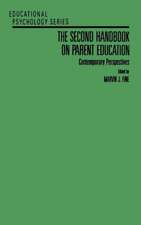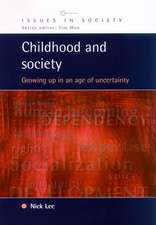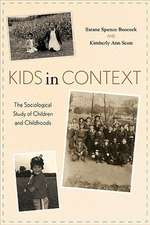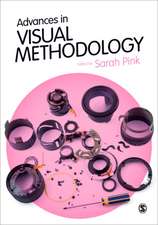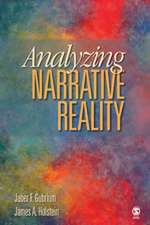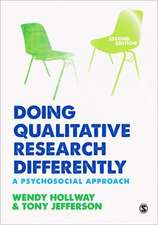Inside Interviewing: New Lenses, New Concerns
Autor James A. Holstein, Jaber F. Gubriumen Limba Engleză Paperback – 13 mai 2003
Preț: 927.20 lei
Preț vechi: 1270.14 lei
-27% Nou
Puncte Express: 1391
Preț estimativ în valută:
177.44€ • 184.57$ • 146.49£
177.44€ • 184.57$ • 146.49£
Carte tipărită la comandă
Livrare economică 12-26 aprilie
Preluare comenzi: 021 569.72.76
Specificații
ISBN-13: 9780761928515
ISBN-10: 0761928510
Pagini: 568
Ilustrații: black & white illustrations
Dimensiuni: 178 x 254 x 30 mm
Greutate: 0.94 kg
Ediția:New.
Editura: SAGE Publications
Colecția Sage Publications, Inc
Locul publicării:Thousand Oaks, United States
ISBN-10: 0761928510
Pagini: 568
Ilustrații: black & white illustrations
Dimensiuni: 178 x 254 x 30 mm
Greutate: 0.94 kg
Ediția:New.
Editura: SAGE Publications
Colecția Sage Publications, Inc
Locul publicării:Thousand Oaks, United States
Recenzii
"The editors' introduction is excellent, providing a brief history of interiewing as a research technique and highlighting many of the issues that concern today's research interviewers...Inside Interviewing would be valuable for doctoral-level research methods classes, as well as for practicing researchers. It is an excellent starting point for examining specific issues, such as reflexivity."
Cuprins
INTRODUCTION Inside Interviewing: New Lenses, New Concerns - James A. Holstein and Jaber F. Gubrium
PART I: SUBJECTS AND RESPONDENTS
Ch. 2. Interviewing Children and Adolescents - Donna Eder and Laura Fingerson
Ch. 3. Interviewing Men - Michael L. Schwalbe and Michelle Wolkomir
Ch. 4. Interviewing Women - Shulamit Reinharz and Susan E. Chase
Ch. 5. Queering the Interview - Travis Kong, Dan Mahoney, and Ken Plummer
Ch. 6 Interviewing Older People - G. Clare Wenger
Ch. 7. Race, Subjectivity, and the Interview Process - Christopher Dunbar, Jr., Dalia Rodriguez, and Laurence Parker
PART II: TECHNICAL CONCERNS
Ch. 8. The Reluctant Respondent - Patricia A. Adler and Peter Adler
Ch. 9. In-person versus Telephone Interviewing - Roger W. Shuy
Ch. 10. Computer Assisted Interviewing - Mick P. Couper and Sue Ellen Hansen
Ch. 11. Standardization and Interaction in the Survey Interview - Nora Cate Schaeffer and Douglas W. Maynard
Ch. 12. Internet Interviewing - Chris Mann and Fiona Stewart
Ch. 13. Transcription Quality - Blake D. Poland
Ch. 14. Computer-Assisted Analysis of Qualitative Interview Data - Clive F. Seale
PART III: ANALYTIC OPTIONS
Ch. 15. Qualitative Interviewing and Grounded Theory Analysis - Kathy Charmaz
Ch. 16. Analysis of Personal Narratives - Catherine Kohler Riessman
Ch. 17. Analytic Strategies for Oral History Interviews - Richard Cándida Smith
Ch. 18. Institutional Ethnography: Using Interviews to Investigate Ruling Relations - Marjorie L. DeVault and Liza McCoy Marjorie L. DeVault and Liza McCoy Marjorie L. DeVault and Liza McCoy
Ch. 19. Ethnomethodological Analyses of Interviews - Carolyn D. Baker
PART IV: REPRESENTATIONAL ISSUES
Ch. 20. Revisiting the Relationship Between Participant Observation and Interviewing - Paul Atkinson and Amanda Coffey
Ch. 21. Cross-Cultural Interviewing - Anne Ryen
Ch. 22. Personal and Folk Narrative as Cultural Representation - Kirin Narayan and Kenneth M. George
Ch. 23. Their Story/My Story/Our Story: Including the Researcher's Experience in Interview Research - Carolyn Ellis and Leigh Berger
Ch. 24. Interviewing, Power/Knowledge, and Social Inequality - Charles L. Briggs Charles L. Briggs Charles L. Briggs Charles L. Briggs
AUTHOR INDEX
SUBJECT INDEX
ABOUT THE CONTRIBUTORS
PART I: SUBJECTS AND RESPONDENTS
Ch. 2. Interviewing Children and Adolescents - Donna Eder and Laura Fingerson
Ch. 3. Interviewing Men - Michael L. Schwalbe and Michelle Wolkomir
Ch. 4. Interviewing Women - Shulamit Reinharz and Susan E. Chase
Ch. 5. Queering the Interview - Travis Kong, Dan Mahoney, and Ken Plummer
Ch. 6 Interviewing Older People - G. Clare Wenger
Ch. 7. Race, Subjectivity, and the Interview Process - Christopher Dunbar, Jr., Dalia Rodriguez, and Laurence Parker
PART II: TECHNICAL CONCERNS
Ch. 8. The Reluctant Respondent - Patricia A. Adler and Peter Adler
Ch. 9. In-person versus Telephone Interviewing - Roger W. Shuy
Ch. 10. Computer Assisted Interviewing - Mick P. Couper and Sue Ellen Hansen
Ch. 11. Standardization and Interaction in the Survey Interview - Nora Cate Schaeffer and Douglas W. Maynard
Ch. 12. Internet Interviewing - Chris Mann and Fiona Stewart
Ch. 13. Transcription Quality - Blake D. Poland
Ch. 14. Computer-Assisted Analysis of Qualitative Interview Data - Clive F. Seale
PART III: ANALYTIC OPTIONS
Ch. 15. Qualitative Interviewing and Grounded Theory Analysis - Kathy Charmaz
Ch. 16. Analysis of Personal Narratives - Catherine Kohler Riessman
Ch. 17. Analytic Strategies for Oral History Interviews - Richard Cándida Smith
Ch. 18. Institutional Ethnography: Using Interviews to Investigate Ruling Relations - Marjorie L. DeVault and Liza McCoy Marjorie L. DeVault and Liza McCoy Marjorie L. DeVault and Liza McCoy
Ch. 19. Ethnomethodological Analyses of Interviews - Carolyn D. Baker
PART IV: REPRESENTATIONAL ISSUES
Ch. 20. Revisiting the Relationship Between Participant Observation and Interviewing - Paul Atkinson and Amanda Coffey
Ch. 21. Cross-Cultural Interviewing - Anne Ryen
Ch. 22. Personal and Folk Narrative as Cultural Representation - Kirin Narayan and Kenneth M. George
Ch. 23. Their Story/My Story/Our Story: Including the Researcher's Experience in Interview Research - Carolyn Ellis and Leigh Berger
Ch. 24. Interviewing, Power/Knowledge, and Social Inequality - Charles L. Briggs Charles L. Briggs Charles L. Briggs Charles L. Briggs
AUTHOR INDEX
SUBJECT INDEX
ABOUT THE CONTRIBUTORS
Notă biografică
James A. Holstein is professor of sociology in the Department of Social and Cultural Sciences at Marquette University. His research and writing projects have addressed social problems, deviance and social control, mental health and illness, family, and the self, all approached from an ethnomethodologically- informed, constructionist perspective.
Descriere
Inside Interviewing highlights the fluctuating and diverse moral worlds put into place during interview research when gender, race, culture and other subject positions are brought narratively to the foreground. It explores the 'facts', thoughts, feelings and perspectives of respondents and how this impacts on the research process.

